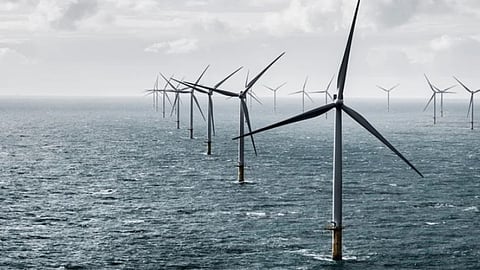Mitsubishi confirms exit from wind power projects due to soaring costs
Mitsubishi Corp will withdraw from three Japanese offshore wind power projects because of soaring costs, it said on Wednesday, dealing a blow to Japan's energy security goals and efforts to reduce its dependence on imported fuel.
A Mitsubishi-led consortia won the first state auctions for the three wind farms in Chiba and Akita prefectures in 2021. The farms had projected capacity of 1.76 gigawatts and were set to start operations around 2028 to 2030.
Mitsubishi Chief Executive Katsuya Nakanishi on Wednesday said cost increases had far exceeded projections, including construction prices more than doubling since the 2021 bidding phase.
"We thoroughly examined every possible measure, but compared to our bidding assumptions, costs more than doubled, making even investment recovery impossible," he told a briefing.
"Even with countermeasures such as supply chain restructuring, we concluded that total expenditures - including maintenance and operational costs - would surpass electricity sales revenue, making project continuation difficult."
Earlier this year, Mitsubishi logged a charge of JPY52.2 billion ($354 million) on the projects. On Wednesday, partner Chubu Electric Power said it expected a loss of around JPY17 billion this fiscal year due to the withdrawal.
While reaffirming Mitsubishi's commitment to “decarbonisation”, Nakanishi stopped short of saying the company would re-enter domestic offshore wind projects, adding only that it must carefully consider its future steps.
Japan wants offshore wind farm capacity to reach 10 GW by 2030 and 45 GW by 2040, and has auctioned around a 10th of targeted capacity. Winners of other offshore auctions include RWE, Iberdrola and BP.
“Undermined trust”, delayed goals
Increasing the share of renewable energy is crucial for Japan, the world's second biggest liquefied natural gas (LNG) buyer after China.
The Ministry of Economy, Trade and Industry has earlier warned that Japan's demand for LNG could be on the rise again as artificial intelligence booms, while renewable energy rollouts risk falling behind the schedule.
Mitsubishi's withdrawal is "deeply regrettable" and will delay offshore wind power expansion in Japan, Industry Minister Yoji Muto told Mitsubishi's Nakanishi, who came to the ministry to report the withdrawal.
"This withdrawal betrays local expectations and risks undermining public trust in offshore wind power," Muto said, adding that the government plans to re-auction the three sites.
However, re-auctioning, given rising costs, could prove challenging.
RWE CEO Markus Krebber said on Wednesday the German company had no interest in taking on the Mitsubishi projects: "Our project pipeline is well filled overall. We are therefore not currently focusing on further projects in Japan."
The ministry has been discussing relaxing rules for developers to encourage the construction of offshore wind farms against the backdrop of a global slump in which projects have been hit by soaring costs and delays.
Denmark's Orsted decided to withdraw from Japan last year as part of its global restructuring, and sources told Reuters in May that London-headquartered Shell shrank its team focused on Japan's offshore wind sector as it scales back low-carbon operations.
"If the projects from consequent rounds are able to move forward, this should not be seen as an apocalyptic event for wind energy in Japan," said Yuriy Humber, CEO of Tokyo-based consultancy Yuri Group.
"Mitsubishi bid aggressively, but macro and other factors went against them. Now there is a rebalancing and, I believe, the sector will emerge stronger in Japan."
(Reporting by Yuka Obayashi and Katya Golubkova; Additional reporting by Kantaro Komiya and Satoshi Sugiyama in Tokyo and Tom Kaeckenhoff in Duesseldorf; Editing by Edwina Gibbs, Christopher Cushing, Barbara Lewis and Tomasz Janowski)


